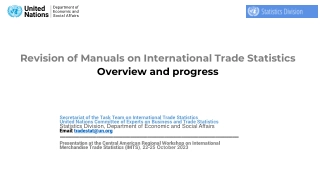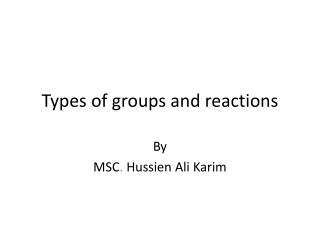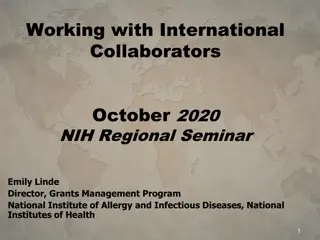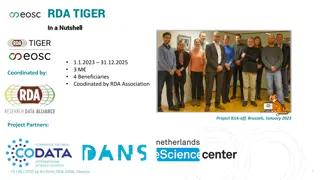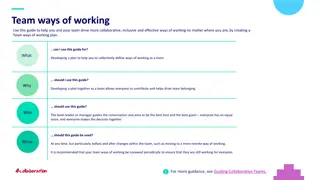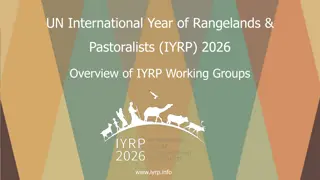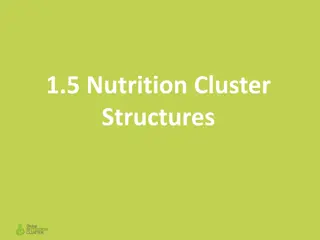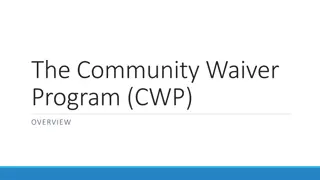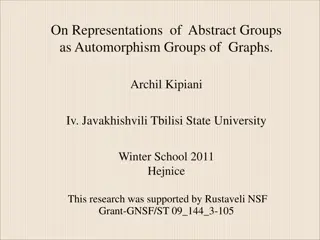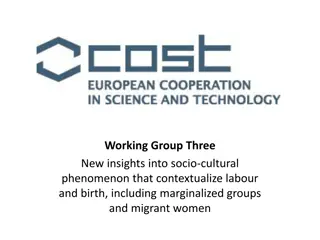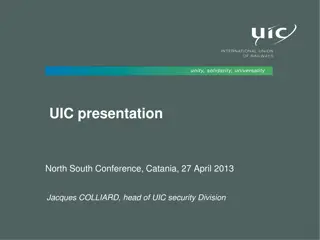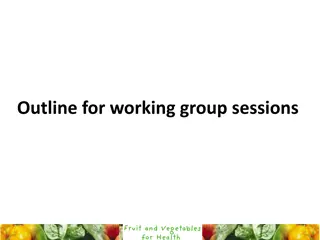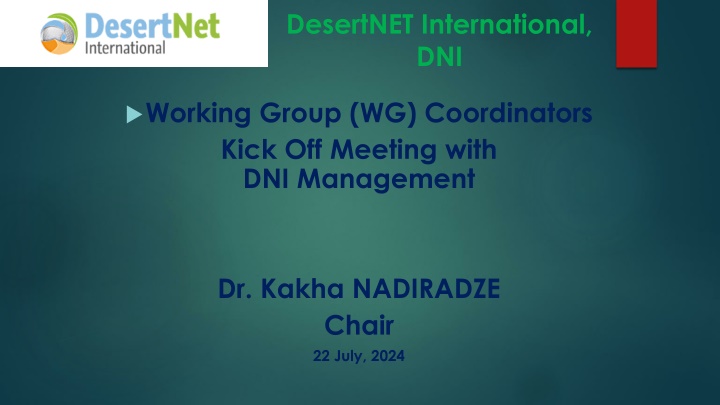
DesertNET International Working Groups Overview
Focus on DesertNET International's varied working groups dedicated to climate change, soil restoration, agroecology, biodiversity, satellite mapping, scientific research, fundraising, and supporting young scientists and PhD students.
Uploaded on | 0 Views
Download Presentation

Please find below an Image/Link to download the presentation.
The content on the website is provided AS IS for your information and personal use only. It may not be sold, licensed, or shared on other websites without obtaining consent from the author. If you encounter any issues during the download, it is possible that the publisher has removed the file from their server.
You are allowed to download the files provided on this website for personal or commercial use, subject to the condition that they are used lawfully. All files are the property of their respective owners.
The content on the website is provided AS IS for your information and personal use only. It may not be sold, licensed, or shared on other websites without obtaining consent from the author.
E N D
Presentation Transcript
DesertNET International, DNI Working Group (WG) Coordinators Kick Off Meeting with DNI Management Dr. Kakha NADIRADZE Chair 22 July, 2024
WORKING GROUPS OF DNI Working Group Working Group Working Group Working Group Working Group Position Papers. Scientific-Research Publications/Articles/N ewsletters editing Fundraising and Research Projects (Horizon Europe, JRC, RFIS, Conferences, workshops Young Scientists and Ph.D. Studen ts Climate Change, Soils Restoration Agroecology, and Biodiversity Satellite Mapping WG (Database, Spatial, Digital tools, Interactive maps PhD. Student Chiara Ceseracciu Dr. Fei WANG Prof. Giovanna Seddaiu Dr. Nausheen Mazhar Dr. Seyed kazem Alavipanah
Climate Change, Soils Restoration, Agroecology, and Biodiversity WG This group focused on understanding and addressing issues related to climate change impacts in desert regions, soil restoration techniques, sustainable agriculture practices (Agroecology), and biodiversity conservation.
Satellite Mapping WG (Database, Spatial, Digital tools, Interactive maps) WG This group deals with utilizing satellite imagery and digital tools to map and monitor desert regions, including the development of interactive maps and spatial databases.
Position Papers, Scientific Research Publications/Articles/Newsletters Editing WG This group is involved in drafting position papers, editing scientific research publications, articles, and newsletters related to desert ecology, management, and research findings.
Fundraising and Research Projects WG This group is responsible for identifying funding opportunities (such as Horizon Europe, JRC, TAIEX, RFIS) and organizing conferences, workshops, and other events to support desert research and collaboration.
Young Scientists and Ph.D. Students WG This group focused on supporting young researchers and PhD students within DesertNET International, providing mentorship, networking opportunities, and support for their research initiatives.
Outcomes & short-term and long-term benefits The Working Groups (WG) are instrumental in fostering collaboration, sharing knowledge, and advancing research and initiatives related to desert ecosystems and sustainability. Each group plays a crucial role in contributing to the broader goals of DesertNET International.
Combating Desertification: A Global Challenge Preserving Our Ecosystems Desertification is the process of land degradation in arid, semiarid, and dry sub-humid areas due to various factors, including climate change and unsustainable human activities. Preserving ecosystems is crucial for maintaining the delicate balance of our planet.
Understanding the Causes of Desertification The primary causes of desertification include overgrazing, deforestation, unsustainable agricultural practices, and climate change. These factors lead to the loss of vegetation, soil erosion, and the degradation of land, ultimately threatening the livelihoods of communities and the biodiversity of these regions.
Innovative Solutions for Combating Desertification Science Based and Nature based Solutions integrated with Digital Solutions Sustainable land management practices, such as agroforestry, conservation agriculture, and land restoration, can help mitigate the effects of desertification. These approaches aim to improve soil fertility, enhance water retention, and promote the growth of vegetation, thereby preserving the delicate balance of fragile ecosystems.
TOWARD A SUSTAINABLE FUTURE: COMBATING DESERTIFICATION By addressing the root causes of desertification and implementing a holistic, collaborative approach, ecosystems and ensure a sustainable future for generations to come. we can preserve our fragile Continued research, policy development, and international cooperation are essential in DNIs global efforts
Key takeaways: Interdisciplinary Focus: Each working group addresses specific facets of desert research, from climate change and biodiversity to satellite mapping and soil restoration. This interdisciplinary approach ensures a comprehensive understanding and effective management of desert ecosystems. Collaborative Efforts: The working groups facilitate collaboration among experts, stakeholders, and young scientists, fostering a synergistic environment for knowledge exchange and innovative solutions. Practical Applications: Groups like Satellite Mapping and Digital Tools emphasize the use of technology for mapping, monitoring, and managing desert landscapes, leveraging spatial databases and interactive maps for actionable insights. Publication and Advocacy: The Position Papers and Publications Editing group plays a vital role in disseminating scientific findings, shaping policy through advocacy, and promoting awareness about desert- related issues. Capacity Building: The focus on Young Scientists and PhD Students ensures continuity in research efforts by nurturing the next generation of desert researchers and providing them with mentorship and support. Strategic Planning and Funding: The Fundraising and Research Projects group strategically pursues funding opportunities and organizes events like conferences and workshops, crucial for advancing research agendas and maintaining international collaborations.
We are committed to: Ensure the sustainability outcomes which can deliver tangible benefits for our Members and for initiating new Projects, Programs and Policy Papers for all stakeholders and Farmers, ranchers, people and the planet. This is critical for the development our collective actions toward of sustainable Soil Sciences in light of new approaches and result oriented coalitions and partnership through to enabling WGs activities more visible and feasible By contributing to DesertNET International's mission implementation within WGs by promoting sustainable desert management, conservation, and resilience through research, advocacy, and collaboration. They reflect a comprehensive approach to addressing complex challenges in desert regions worldwide.
Water-Soil-Food-Health Nexus Certainly, desertification is closely correlated with agri-food systems due to several interconnected factors: Land Use Change: Agricultural practices often involve clearing land for cultivation, which can lead to soil degradation and increased vulnerability to desertification, especially in arid and semi-arid regions. Soil Erosion: Intensive agricultural practices, such as monocropping and overgrazing, can accelerate soil erosion. Erosion reduces soil fertility and water retention capacity, making the land more susceptible to desertification processes. Water Management: Poor water management practices in agriculture, such as inefficient irrigation systems or excessive water extraction, can contribute to water scarcity and desertification in already arid areas. Deforestation: Clearing land for agriculture can also involve deforestation, which disrupts ecosystems and reduces vegetation cover. This loss of vegetation accelerates soil erosion and reduces biodiversity, further exacerbating desertification risks. Climate Change: Agriculture contributes to greenhouse gas emissions and is also affected by climate change impacts such as increased temperatures, altered precipitation patterns, and more frequent extreme weather events. These changes can exacerbate desertification processes in vulnerable regions.
Sustainable Agri-Food Systems Addressing desertification within agri-food systems requires sustainable land management practices that aims to enhance soil health, conserve water resources, and promote resilient agricultural practices. Integrated approaches that consider both environmental conservation and agricultural productivity are essential to mitigate the impacts of desertification and ensure the long-term sustainability of agri-food systems in arid and semi-arid regions.
The Action Plan Insights into Latest Thinking and Developments: Being part of such a coalition or communities for EU Grant Projects and Calls and stay updated on the latest research, strategies, and best practices, This could include new methodologies, case studies, policy developments, and innovative projects from our Members as bottom up incentives. Newsletters and Project Updates: Membership often anticipates receiving monthly or quarterly newsletters and updates that provide valuable information on ongoing projects, upcoming events, and relevant news related to the DNIs Activities and community development. These updates can help us to stay informed and potentially participate in collaborative projects or initiatives. Networking and Collaboration Opportunities: Being part of any International coalition offers networking opportunities with like-minded individuals and organizations. It can facilitate collaborations, partnerships, and the exchange of ideas that can further enhance your understanding and impact in the field of Membership Development and young Scientists engagement.

